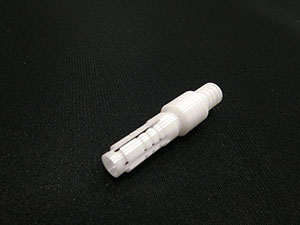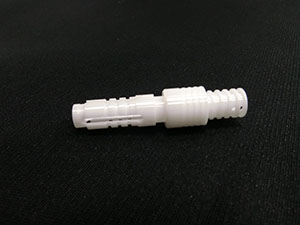Bioceramics
Bioceramics
High-performance ceramic materials specially used in the medical field with excellent biocompatibility and mechanical properties. These materials are widely used in various medical devices and instruments in the human body and have become an integral part of modern medicine.Bioceramic materials mainly include the following types:
1. Zirconia: It has high strength and toughness and is commonly used in dental implants and hip replacements.
2. Alumina: High hardness, good wear resistance, often used in artificial joints and dental repairs.
3. Hydroxyapatite: It has excellent compatibility with bone tissue and is often used for bone transplantation and bone repair.
4. Glass-Ceramics: The composition can be adjusted to achieve specific biological activity, often used in bone filling materials.
(More)
Bioceramic materials have the following main properties:
1. Biocompatibility: It will not cause immune response or rejection and can be well integrated with human tissues.
2. Excellent mechanical properties**: It has high strength, high hardness and wear resistance, and can withstand various pressures and frictions inside the human body.
3. Chemical stability: Not easy to decompose or dissolve in body fluids, ensuring safety for long-term use.
4. Plasticity: Can be made into various shapes and sizes as needed to adapt to different medical needs.
The manufacturing process of bioceramics requires strict control to ensure their quality and performance. The main process requirements include:
1. Purity control: Raw materials must be of high purity to avoid the impact of impurities on material properties.
2. Sintering process: The material is densified through high-temperature sintering to improve its mechanical strength and stability.
3. Precision processing: Use advanced processing technology to produce product shapes and sizes that meet medical standards.
4. Surface treatment: Treating the surface of materials to improve their biocompatibility and adhesion.
Bioceramic materials are widely used in various medical products, mainly including:
1. Artificial joints: Joint materials used in replacement surgeries such as hip joints and knee joints.
2. Dental Implants: Implant materials used for tooth repair and replacement.
3. Bone filling materials: materials used for fracture repair and bone defect filling.
4. Cardiovascular stents: stent materials used in cardiovascular surgeries to provide blood vessel support.
international norms
The application of bioceramic materials is governed by strict international regulations to ensure their safety and effectiveness. Major international norms include:
1. ISO 13485: Medical device quality management system standard, ensuring full-process quality control of products from design to manufacturing. (More)
2. ISO 10993: Biocompatibility evaluation standard, used to evaluate the impact of materials on the human body.
3. FDA (U.S. Food and Drug Administration) certification**: Medical products sold in the U.S. market need to pass strict review and certification by the FDA.
In 2018, we successfully advanced artificial heart technology to a new stage with biotechnology companies and began to use bioceramic materials as key components.


- About usLONGYI
- Products
- Advanced Ceramic & Fine Ceramic
- Hard and brittle materials processing
- Contact Us
- News
- Antistatic-ceramic suction cups officially enter the KLA supply system
- Chinese New Year Celebration Announcement
- Since the epidemic of COVID-19 is serious, the production staffs work separately by turns. Delivery time must be affected by process extension.
- Porous Ceramic Vacuum Chuck + Granite Base
- Company relocation notice
- Ceramic characteristics
- Ceramics Gas Tube ASSY
- Die bonder Dispensing Pin 45mil D/B
- Fittings
- Ceramic Ferrule
- Tokyo Weld / Tester / Packaging Machine / Ceramic Index table
- Ceramic Nozzle
- Ceramic Nozzle
- Ceramic Nozzle
- Die bonder Dispensing Pin D/B
- Porous ceramic vacuum chuck
- Advanced Ceramic & Fine Ceramic
|
LONGYI PRECISION TECHNOLOGY CO., LTD.
Address : No. 705, Longxing Road, Chungli District , 32091, Taoyuan, Taiwan
Tel : +886-3-466-6611 Fax : +886-3-466-7722 |
Designed by MIRACLEWeb Design
